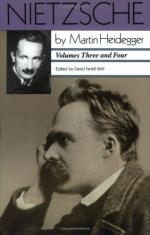|
This section contains 6,491 words (approx. 22 pages at 300 words per page) |

|
SOURCE: “Franz Kafka and Literary Nihilism,” in Journal of Modern Literature, Vol. 6, No. 3, September, 1977, pp. 366-79.
In the following essay, Emrich analyzes Kafka's complex relationship to nihilism.
That the political movement known as Nihilism originated in Russia is a well-known fact of modern history. Literary nihilism, a much less consciously organized movement, also has its origins in Russia. The word “nihilism” first emerges in Turgenev's novel Fathers and Sons (1862), where the young Bazarov, a representative of Western materialism and radical sceptical thinking, is described as a nihilist. In the following violent debate over this figure, after whom revolutionary groups in Russia then called themselves Nihilists, although they had at first sharply rejected the figure of Bazarov as a caricature of their own intentions, Dostoevsky, whose own novels and theoretical writings were primarily concerned with the struggle against Western materialism, atheism, and nihilism, had the following to say:
Nihilism...
|
This section contains 6,491 words (approx. 22 pages at 300 words per page) |

|


